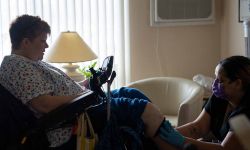Michigan health chief: COVID death count in long-term facilities may be ‘low’

July 7: Michigan auditor general vows ‘comprehensive’ review of nursing home deaths
Michigan’s top health official acknowledged Thursday that the number of reported COVID-19 deaths in all types of long-term care facilities may be “low.”
Health and Human Services Director Elizabeth Hertel told lawmakers that 38 of 311 long-term care facilities statewide have not reported COVID-19 deaths as required, while the state didn’t require deaths to be reported at facilities that serve 12 or fewer residents.
Her testimony before the House Oversight Committee followed months of scrutiny from Republicans over Democratic Gov. Gretchen Whitmer’s handling of COVID cases at senior facilities.
Related:
- Records: COVID-19 nursing home deaths may have been undercounted in Michigan
- COVID rates plunge in Michigan nursing homes following vaccinations
- Hugging stations: How some Michigan nursing homes fight despair amid COVID
But Hertel stood by the state’s total of deaths in nursing homes, which are licensed by the state and have drawn controversy because of Whitmer’s decision early in the pandemic to use some as “hubs” for recovering COVID patients.
“What the nursing homes are reporting are accurate,” Hertel said, adding they had no “reason or incentive to hide (deaths).”
Republicans nonetheless are calling for an audit, following a story first reported in Deadline Detroit that the state discovered 648 nursing home deaths among nearly 1,500 deaths from March through June 2020 in which COVID-19 was suspected after a review of death and medical records.
Three times a week, the state reviews all deaths to determine if anyone who died who also had a recent, positive COVID-19 test.
Out of more than 19,200 total COVID-19 deaths, 7,000 were discovered after a review of death records and the state’s records of positive tests.
All told, 5,600 of Michigan’s COVID-19 deaths involved patients at long-term care facilities and nursing homes, 36 percent of the state’s total.
Testifying Thursday, Hertel was adamant that the 648 deaths are included in the state’s tallies. Nursing homes could lose their licenses and Medicaid funding if they are caught failing to report numbers, Hertel said.
But some nursing home officials who spoke with Bridge Michigan last week said it wasn’t clear how nursing homes would know about a COVID-19 determination that occurred well after death.
Steve Delie, an attorney for the Mackinac Center for Public Policy, filed a lawsuit to secure the COVID-19 records from the state on behalf of a Michigan-based podcast, No BS News Hour.
He told lawmakers Thursday that the records he received in the suit made it clear the state wasn’t counting all long-term care deaths, including those at smaller facilities. He asked the committee to get a list of all deaths and compare it with the list of all long-term care facilities.
“The people of the state of Michigan deserve to know who died and where,” Delie said.
But Hertel and others pointed out that death records don’t always list the nursing home address of the dead. It could be their permanent home or even the hospital where they died.
Rep. Steve Johnson, who chairs the Oversight Committee, said he wants Michigan Auditor General Doug Ringler to further investigate the deaths in long-term care facilities.
“It appears we do not have an accurate count of COVID-19 deaths in nursing homes in Michigan,” said Johnson, R-Wayland.
“We shouldn’t be up here guessing what the number is,” he added.
Unlike in New York, where Gov. Andrew Cuomo’s administration is accused of hiding nursing home deaths, Johnson there is no indication that any undercount in Michigan is “willful.”
Later Thursday, at a media event with the Michigan Republican Party, Johnson said Whitmer's decision last year to send some COVID-19 patients to nursing homes was "disastrous."
"Putting COVID patients into nursing homes was a deadly decision and we need to know how deadly," Johnson said.
Whitmer moved the state away from sending COVID-19 patients to 21 "regional hubs" in nursing homes on Sept. 30. Since then, the state has used “care and recovery centers” which had stricter safety standards. The change came after complaints that the hubs were causing more infections among those facilities’ residents.
However, a study in 2020 by the Center for Health and Research Transformation at the University of Michigan concluded in September 2020 that the “hub” strategy – adopted by other states as well — performed well in Michigan. The study was independent of the state and funded by non-profit Michigan Health Endowment Fund, which works to “improve the health and wellness of Michigan residents while reducing healthcare costs.”
The study found that deaths among residents in hub nursing homes were 20 percent of residents, compared to 26 percent in non-hub nursing homes. CHRT did suggest recommendations to improve care, some of which were adopted when the state changed its policy in September.
If there is an undercount, it’s far smaller than some have suggested because vaccinations have helped protect most residents in long-term care settings.
From the beginning of the pandemic until Jan. 31, there were 5,434 reported long-term care deaths — nearly 37 percent of the more than 14,900 people who died in Michigan from COVID-19 up until then.
But after mass vaccinations first targeted residents at long-term care facilities, COVID-19 cases and deaths in those settings have plummeted.
Since Feb. 1, there have been 229 nursing home deaths, or 5.3 percent of the 4,320 who have died since Feb. 1 from COVID-19, according to state records.
See what new members are saying about why they donated to Bridge Michigan:
- “In order for this information to be accurate and unbiased it must be underwritten by its readers, not by special interests.” - Larry S.
- “Not many other media sources report on the topics Bridge does.” - Susan B.
- “Your journalism is outstanding and rare these days.” - Mark S.
If you want to ensure the future of nonpartisan, nonprofit Michigan journalism, please become a member today. You, too, will be asked why you donated and maybe we'll feature your quote next time!




